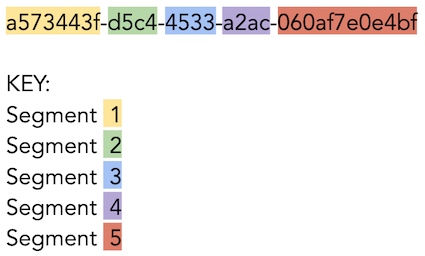

First install it using npm install uuid Then create a js file (script.js) with the following contents const uuid require ('uuid') console.log (uuid ()) console.log (uuid ()) console.log (uuid ()) You can run it using the following command node script. Note: You can also use your own pseudo-random number generators to generate ULIDs. We can use npm's uuid module for generation of RFC4122 UUIDS. import from 'ulid' const random_number_gen = detectPrng(true) const ulid = factory(random_number_gen) However, if you want to use Math.random() in ULID, you need to allow permission for that explicitly. But, ULID blocks the use of Math.random() by default and automatically decides a suitable random number generator based on the situation.įor example, it will use crypto.getRandomValues for browsers and crypto.randomBytes for Node environments. Most random ID generators use unsafe Math.random() to generate IDs. Note: The timestamp part of the ULID is represented with UNIX-time in milliseconds, and it won’t run out of space ’til the year 10889 AD. This library supports both version 4 UUIDs (UUIDs from random numbers) and version 1 UUIDs (time-based UUIDs), and provides an object-oriented interface to print a generated or parsed UUID in a variety of forms.

Developers can use the native JavaScript crypto library to generate a UUID: crypto.randomUUID() // '5872aded-d613-410e-841f-a681a6aa8d8b' crypto.randomUUID() // 'fe6c7438-a833-4c7c-9ea3-cdc84ef41dfc' crypto.randomUUID() // 'e47a03d4-5da3-4451-a2c1. UUID.js is a JavaScript/ECMAScript library to generate RFC 4122 compliant Universally Unique IDentifiers (UUIDs). Instead, you can use the timestamp representation of ULID to order or partition data based on the created time. In any event, I was recently surprised to see that JavaScript has the ability to create UUIDs. This feature of ULID allows developers to easily manage database-related tasks like sorting, partitioning, and indexing.įor example, you don’t need to create an extra column to maintain the record created time. Lexicographical sortability is one of the most highlighted features of ULID.Īs we are already aware, ULIDs can be sorted. It excludes I, L, O, and U letters to avoid any unexpected confusion. Note: ULIDs are encoded using Crockford’s Base32 alphabet ( 0123456789ABCDEFGHJKMNPQRSTVWXYZ). The UUIDs generated by this site are provided AS IS without warranty of any kind, not even the warranty that the generated UUIDs are actually unique.

The Version 4 UUIDs produced by this site were generated using a secure random number generator. Both these parts are base 32 encoded strings and represented using 48 bits and 80 bits, respectively.įor example, break down of the above ULID would look like this: 01FHZXHK8PTP9FVK99Z66GXQTX Timestamp (48 bits) - 01FHZXHK8P Randomness (80 bits) - TP9FVK99Z66GXQTX A Version 4 UUID is a universally unique identifier that is generated using random numbers. The first 10 characters of the ULID represent the timestamp and the second part of the ULID represents randomness. Example UUID 01FHZXHK8PTP9FVK99Z66GXQTX Vue-uuid is an npm package for nodejs Applications.When you generate an ID using UUID, it will generate a 36 character long string by only considering randomness or timestamp.īut, ULID considers both randomness and timestamp to generate IDs and they are encoded as 26 character strings (128 bits). Let’s take a look at 4 different ways to generate UUIDs in JavaScript. We can generate GUID in multiple ways, vue-uuid usage example
UUID GENERATOR JS CODE
UUID GENERATOR JS HOW TO


 0 kommentar(er)
0 kommentar(er)
